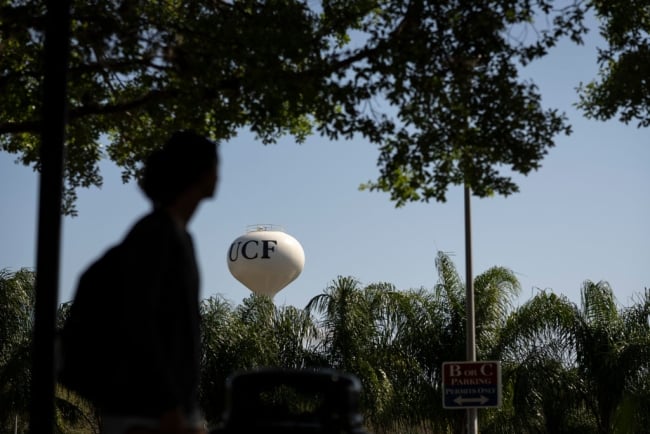You have /5 articles left.
Sign up for a free account or log in.

The Board of Governors approved regulations to guide the implementation of SB 266 during a meeting on the University of Central Florida’s campus.
Thomas Simonetti / The Washington Post via Getty Images
Despite significant public opposition, the State University System of Florida’s Board of Governors approved regulations that will govern how the system’s 12 universities must comply with Senate Bill 266, the state’s anti-DEI bill, during a meeting Thursday at the University of Central Florida.
SB 266 prohibits public universities from using state dollars to fund any activities concerning “diversity, equity and inclusion” or “political or social activism.” But the new regulations adopt a broad interpretation of the terms, defining DEI as “any program, campus activity, or policy that classifies individuals on the basis of race, color, sex, national origin, gender identity, or sexual orientation and promotes differential or preferential treatment of individuals on the basis of such classification.”
Political or social activism is defined as any activity aimed at “effecting or preventing change to a government policy, action, or function, or any activity intended to achieve a desired result related to social issues, where the university endorses or promotes a position in communications, advertisements, programs, or campus activities.” Social issues are further defined as “topics that polarize or divide society among political, ideological, moral, or religious belief.”
The sweeping definitions prompted an outcry from students, professors and community members, many of whom spoke out at the meeting. But because the public comment period for a Board of Governors meetings is only 15 minutes, each speaker had only one minute to talk—and not all who wanted to talk got a chance. Of those who did, the majority opposed the regulations, arguing that they would squelch freedom of expression.
“This board has opted to impose more restrictive and harmful burdens on Florida students, going beyond what [the DeSantis] administration’s ‘slate of hate’ was able to impact last legislative session and exceeding its oversight authority,” said Quinn Diaz, public policy associate for the LGBTQ+ advocacy nonprofit Equality Florida. “This board is signaling its fear of students’ voices uniting for the greater good of our communities while betraying its duty to teach and to inform and its mission to achieve excellence.”
Although some questioned whether student organizations like the College Republicans and College Democrats would be able to operate under the new regulations, SB 266 explicitly allows organizations, paid for by student fees, to operate “notwithstanding any speech or expressive activity by such organizations which would otherwise violate this subsection.”
Some commenters argued that the regulation could impact academics. Elizabeth Bercaw, a graduate student at Florida Atlantic University, said she doubts a professor of women’s, gender and sexuality studies could even present data on sexual violence under the board’s regulation.
“I could go on and state a lot of statistics that I am learning about in my class, but the point is, under Rule 9.016, we might not be able to learn about this and we might not be able to read the UN Human Rights Report on ending gender violence, simply because official documents like this mention gender and they mention identity,” she said. “Academic freedom allows research to go beyond the campus and towards addressing the most serious problems that people face. Rules such as this will significantly hinder our ability to do so.”
The board’s student member, Jack Hitchcock, also questioned whether the regulation concerning political and social activism would interfere with the ability of university officials to state their opinions on global events, as some presidents did in statements and editorials supporting Israel after the attack by Hamas on Oct. 7. In response, Rachel Kamoutsas, general counsel and corporate secretary for the board, suggested that such statements may be permissible under the regulation that allows political statements endorsing existing laws or policies, but she did not specify which law statements supporting Israel would endorse.
Ultimately, the board gave “public notice of intent to adopt” the regulation, with only Hitchcock and Amanda J. Phalin, the faculty member of the board and a University of Florida professor, voting against it.
A number of other controversial regulations received board approval during the Thursday meeting as well, including guidance for implementing Florida’s “bathroom ban,” which disallows people from using a bathroom that doesn’t correspond to the sex they were assigned at birth. According to the law, anyone who does so and doesn’t leave when asked can be charged with a misdemeanor of the second degree; the Board of Governors’ new regulation additionally states that employees who violate the law “are subject to their university’s established disciplinary procedures, which must include disciplinary actions up to and including dismissal.”
Phalin argued against the regulation, stressing that “there is no empirical evidence that links granting transgender individuals access to corresponding-gender bathrooms [to] an increase in sexual offenses.” She and Hitchcock, again, were the sole votes against the regulation.
The board also officially approved the appointment of Richard Corcoran, the former commissioner of education for Florida, as New College of Florida’s president; he has served as interim since February, largely leading the college’s makeover into a bastion of what he has called “classical liberal arts education” that has driven many progressive students away.
As part of the consent agenda, the board also approved the public liberal arts college’s new accountability plan, which decreases four-year graduation rate goals for students who entered New College between fall 2020 and fall 2023, along with several other metrics.




